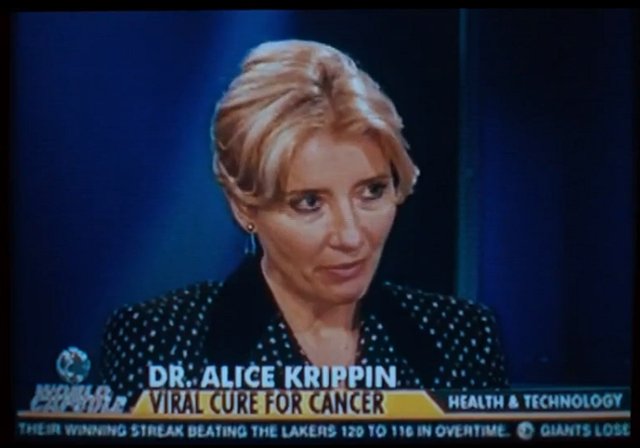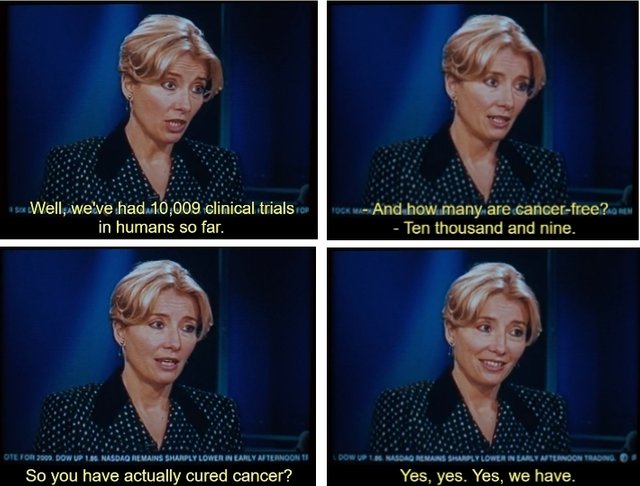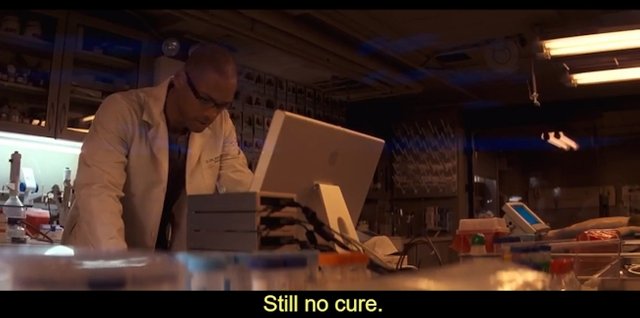Science in Hollywood: I Am Legend (2007)

DISCLAIMER: This post contains what I would call light spoilers, as in they reveal some aspects of the plot, but they are not crucial enough to give away the most exciting core of it. In other words, you can read this article and still enjoy the film without being spoiled about a key development of it. Enjoy!

Film: I Am Legend (2007)
Scientific topics: Virology, genetic engineering, cancer therapy.

Short summary: As a terrible and unexpected side effect of a viral anticancer therapy, an uncontrollable virus spreads over the entire human population, turning them into aggressive, light-sensitive zombies. A few years after the incident, it seems like Dr. Robert Neville is the lone survivor of the pandemic. Having been a high level scientist within the military of the USA, Neville spends his lonely days trying to save humanity by manufacturing a serum that could reverse the effects caused by the virus, against which he seems to possess natural immunity.
While in most zombie films the zombies “just appear” and then start biting people and spreading their zombiness around, I Am Legend offers an interesting origin for the zombie plague.
The film opens with a short interview to a certain Dr. Alice Krippin, who claims to have found a definitive cure for cancer:

Quoting her segment in the interview, when asked how she developed a virus that destroys cancer:
"Well the premise is quite simple: take something designed by nature and reprogram it to make it work for the body rather than against it […] In this case the measles virus which has been engineered at a genetic level to be helpful rather than harmful.
Imagine your body as a highway and you picture the virus as a very fast car driven by a very bad man, then imagine the damage that that car could cause; but if you replace that bad man with a cop, the picture changes. "
While I am not very convinced by her car analogy, that dialogue introduces us into a very interesting topic…
Can viruses kill cancer? – The Science behind it.
While I cannot discuss much about the possibility of a virus turning people into zombies –probably to everyone’s disappointment– the concept of using modified viruses to fight cancer is not mere science fiction.
It all started with some documented cases in the early 20th century where remission was observed in cancer patients after having a viral infection – for example, patients with leukemia would later appear disease-free after having a viral infection with influenza or chickenpox. These virus came to be known as oncolytic viruses for their ability to destroy cancer cells.
While this early evidence posed the potential of using viruses to fight a deadly disease like cancer, many obstacles came in the way. To begin with, not all the cases had shown complete remission, and thus the cancer came back later; another problem was that while some of these viruses attacked cancer cells, they were not 100% specific and therefore would also hit normal cells, bringing upon the patient many undesired or dangerous side effects –and in some cases, even death–caused by the viral diseases. Finally, in the case of milder viruses, the natural immunity that the human body developed towards them many times dismantled them before they could perform their anti-cancer task.

Therefore, around the 1960s it was recognized that if viruses were to be used as an anticancer therapy, they would have to be modified from their natural form in order make them both more specific towards cancer cells and less dangerous for the human body. However, in that time the technology necessary to achieve something like that had not been developed so this idea remained dormant for a while.
It wasn’t until the genetic engineering revolution in the 1990’s that modifying a virus in such a way became possible. By using molecular tools, scientists were able to edit the genetic code of viruses in the following ways:
- Deleting viral genes to improve tumor selectivity.
- Inserting cancer-fighting genes using genetic engineering to enhance their antitumoral activity. For example, by introducing genes in the virus that express molecules that stimulate the immune system and guide immune cells towards the destruction of tumor cells.
- Engineer them to carry molecules that enhance intake of radioactive particles into the infected cells. This kind of virus is designed with the aim to be used along with radiation therapy, in such a way that the virus infection delivers a transporter molecule to be produced in the cancer cell infected, enhancing its intake of radioactive molecules which results in their accelerated destruction.
Then… shall we believe Dr. Krippin when she says:

As a fellow scientist, I would be highly suspicious of anyone making such a claim. Anyone who has been involved in the scientific process and knows how science works would never be in favor of such an absolute claim. Biological responses are incredibly complex, constantly evolving phenomena that are not 100% predictable. Therefore, that would be the sort of irresponsible statement that could easily lead to a swift zombie pandemic paper retraction.
Such statement is problematic because cancer is not one disease that can be cured with a single, silver bullet-style treatment. Why? Because in fact, cancer is the generalized name that we use to designate a very wide variety of diseases that have one feature in common: out of control proliferation of cells in a given tissue or organ. Furthermore, this uncontrolled proliferation can have many causes, resulting on these diseases showing vastly different characteristics, behaviors and prognostic (which is another way of saying some are easier to treat than others).

Therefore, it is highly unlikely that we could find a cure targeting a factor that is common to ALL of these diseases–while leaving normal cells unaffected. That would be like the holy grail of cancer research. Also, because of the immense individual variation between humans, a 100% result would be pretty much impossible to achieve.
Let’s look at some actual results from clinical trials using oncolytic viruses:

So, while this kind of therapy is far from curing all cancer (in fact, like all therapies available, it doesn’t cure 100% of a single type of cancer), the results are encouraging enough to keep exploring this option.
It is very important to highlight that current methods of genetic engineering have been very successful in making them safe for humans, so most likely we can rest assured that there will be no zombie outbreak as a result (let’s hope).

>>To date, two genetically engineered oncolytic viruses have been approved for marketing as drugs. One of them is Oncorine (mentioned in the table above), approved in China for head and neck cancer and esophagus cancer in 2005; the other one is T‐Vec, which was approved for melanoma by the FDA in the USA in October 2015, as well as Europe and Australia in 2016.<<
Source: From Bench Top to Bedside: A Review of Oncolytic Virotherapy (2016)
Furthermore, more recent efforts have been focused to combine oncolytic viruses with immunotherapy, with the aim to create a highly specialized and targeted reaction enhancing the immune system of the patient, to make it capable of killing tumor cells more effectively.

---------------------------------------------------
REFERENCES:
- From Benchtop to Bedside: A Review of Oncolytic Virotherapy (2016).
- Oncolytic virus therapy: A new era of cancer treatment at dawn (2016) --> Very good read if you want to know more about how these cancer-killing viruses work.
- Prospects for combined use of oncolytic viruses and CAR T-cells (2017).
(All free access articles)
Image sources: Poster from IMDB, the rest are stills from the film itself.
"the other one is T‐Vec"
Sounds suspiciously like the t-virus. Illuminati confirmed
Oh, no! Don't say it out loud, @trumpman...
This post was a very nice read. I remember when I was in middle school and I had postulated the thought of actually doing this in real life, and all my friends responded with "Haven't you seen I Am Legend? Because that is why we shouldn't do that."
I think it is honestly really awesome that research is going into this and am so glad that I noticed this post, it was definitely worth the read! I think probably my favorite thing you said though is:
as too often I see people talk in reference to cancer as a single disease over treating it as it is, a classification of diseases. Thank you for sharing!
Thank you so much for such nice feedback, @kryzsec! I didn't know that the premise behind the zombie plague in I Am Legend was so well known, hehe...
However, it is certainly cool to find out that something that sounds so fantastic is now actually very close to real life application (or in some cases, have been already applied with success). See? Your idea was perfectly good :-)
Another great post. Your analysis of the effectiveness of real life cancer treatments and implementation or oncolytic virus therapy really takes this to the next level.
Thank you for such great feedback, I really appreciate it as it helps me improve things on the long run :-)
A man and his dog in apocalypse land... I really felt the bond between them and Will Smith's acting was very good in my opinion. I liked this movie and the story was pretty innovative too.. A wrong implementation of the presumable cure of cancer and suddenly all are turned into zombies except a select few. The climax was also good and this movie surely kept me till the very end.
This story is also pretty educative as part of the moral for me is that power comes with a responsibility and the greater the power, the greater the responsibility. Playing with fire sometimes can turn really lethal!
I pretty much agree with your scientific inputs. I'm keeping this:
This is true and this is the real difficulty with combating cancer. Cancer is the name of the effect and it too differs from time to time. Causes are also numerous so this complicates the matter a lot.
No need to add anything here...
Great post @irime! Looking forward for the next in the series!
Yes, I find that one of the reasons why the general public gets so suspicious about "how come we haven't found a cure for cancer yet despite so much research" is because of a failure to grasp the concept of cancer being a general term for a myriad of diseases.
Great advances have been made, but in many cases a lot of further research is needed both to improve efficacy and to minimize damaging side effects (lest we end up unleashing the zombie apocalypse, hehe).
Thanks for this thoughtful comment, @theodorelib!
Hello @irime really nice post here. Could you please do me one favor? Could you put the following paragraph in a block quote and add a direct citation marker?
This is a direct quotation (not even paraphrasing) from the source material. (The from bench top to bedside article) As such in it's current form it constitutes plagiarism despite you having cited the source article at the bottom. You need to credit directly the original author who wrote those statements.
Thank you!
Oh, no... You are completely right, I just checked. I usually copy and paste notes in my drafts to have the info at hand while I write, but I mistakenly left that in without reviewing it to properly integrate it or paraphrase, my apologies! I will be more careful next time. For now I'll just add the attribution quickly since it's late, I will further review it tomorrow. Thanks for helping improving the content on Steemit, @justtryme90!
It's not a problem, I pointed it out because your work is always carefully constructed so I assumed you just forgot some quotation marks. Thank you for correcting the issue.
Complete review of project free TV to stream movies online
https://moneymakingway.com/project-free-tv/